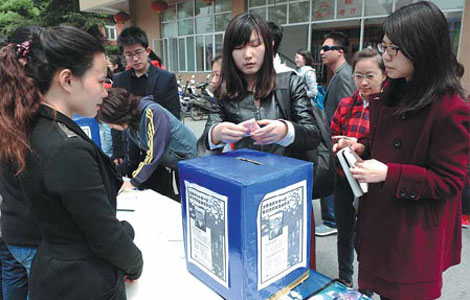Soil pollution data remains secret
Updated: 2013-05-09 23:27
(Xinhua)
|
|||||||||||
BEIJING - The Ministry of Environmental Protection (MEP) will not issue data related to soil pollution for the time being but will discuss the situation after an in-depth investigation, the ministry confirmed on Thursday.
The ministry said it will be difficult to investigate soil pollution nationwide, adding that it will conduct further investigations in heavily polluted areas.
In January, Beijing lawyer Dong Zhengwei sent an application to the MEP asking the ministry to issue soil pollution data, as well as create detailed measures to handle it.
The ministry said in February that the data is a state secret and refused to issue it. Dong was not satisfied and sent a second request.
In the ministry's second response to Dong, it said soil pollution is still being investigated and related data remains a state secret, adding that data will be released after further evaluation.
After news of Dong's requests spread online, many people began to wonder just how polluted the country's soil is.
Ma Jun, head of the Institute of Public and Environmental Affairs, said in an interview with the Legal Daily that polluted soil may affect public health via food, crops and underground water.
"Soil pollution is related to public health. Therefore, the public should have the right to be informed about the situation," Ma said.
Ma cited experience following the issuance of data for PM2.5, or airborne particles measuring 2.5 microns or less in diameter, as reason to issue the soil data.
Real-time air quality monitoring data detailing PM2.5 intensity in 74 major cities was made available to the public this year following complaints about air quality.
China is now facing a grave soil pollution situation. Heavy metals have severely polluted some areas, mines and factories have degraded soil in industrial areas and the amount of arable land is decreasing due to the use of pesticides and chemical fertilizers.
Heavy metal pollution alone results in the loss of 10 million tonnes of grain and the contamination of another 12 million tonnes annually, incurring 20 billion yuan in direct economic losses each year, the Ministry of Land and Resources estimated in January.
According to a report on China's environment in 2011 issued by the MEP, 21.5 percent of soil samples from 364 rural villages failed to meet national soil quality standards.
Soil around landfills, farms and companies also tends to be contaminated, the report said.
In April, underground water in north China's Hebei Province turned red as a result of soil pollution. Animals that drank the water were found dead.
Local authorities said pollutants were discharged from chemical factories, contaminating superficial groundwater.
The State Council has set a goal of containing soil pollution by 2015, according to a circular on soil pollution.
The circular ordered a thorough soil pollution survey to be conducted by 2015, as well as called for the establishment of a system that can protect arable land and sources of drinking water.
Related Stories
Guiyang: Dealing with pollution at its source 2013-05-09 14:36
Ministry responds to public concerns about pollution 2013-05-09 08:06
China punishes factories for pollution violations 2013-05-09 00:17
Heavy pollution continues to shroud Beijing 2013-05-06 20:19
Watchdog weak over polluting firms 2013-04-15 19:58
Today's Top News
China to use existing mechanisms in border issues
China does not accept Japan's protest
Chinese president meets Israeli prime minister
5 missing after E China ship collision
Free funeral service available for poor people
Govt, UN participate in environmental program
China fines 88 companies for polluting water
Chinese now largest foreign-student nationality
Hot Topics
Lunar probe , China growth forecasts, Emission rules get tougher, China seen through 'colored lens', International board,
Editor's Picks

|

|

|

|

|

|





